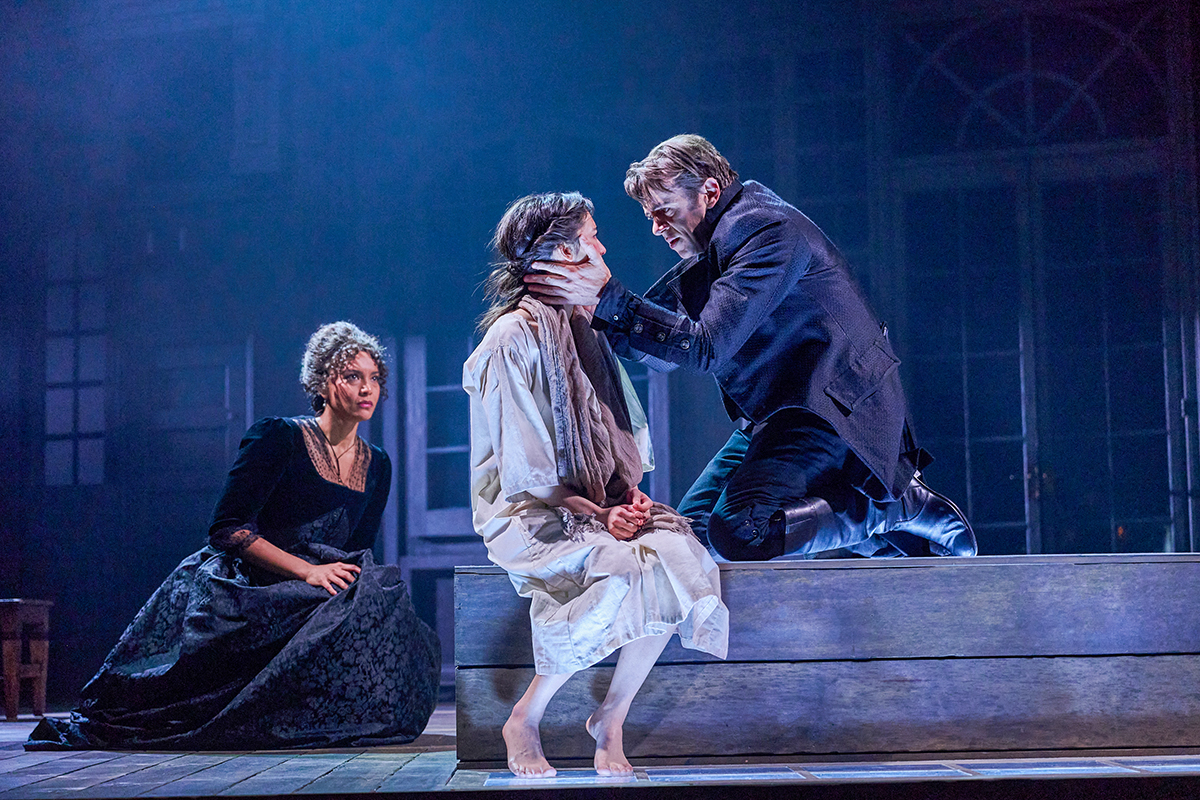‘Leopoldstadt’ is Ambitious but Lacks Emotional Connection
Tom Stoppard’s epic raises important questions about how easy it has been for society to decide that their Jews don’t belong.

A play of epic proportions, Tom Stoppard’s Leopoldstadt has almost equally epic challenges and, like a suit that doesn’t quite fit, it feels just a little too big for the Shakespeare Theatre Company’s production.
Immense in scope, Stoppard’s semi-autobiographical journey weaves its way from 1899 through 1955 as multiple generations of a wealthy Jewish family in Vienna experience war and antisemitism in ways that will forever change their lives and identities.
Heavy on the expository and vignette-driven, family gatherings share space with spirited conversations about Zionism, the creation of a Jewish homeland, and the growing “othering” of Viennese Jews as time passes through Germany’s annexation of Austria, two world wars, and a final post-war-Vienna pause.
For those who know to listen for it, there is even an intriguing, overarching nod to the mystery of prime numbers and Stoppard’s suggestion that perhaps there is a theory that explains not just the numbers, but the pattern of our lives. Coming in at an operatic near-three hours, it’s a hell of a lot to keep afloat.
Director Carey Perloff certainly keeps the pace swirling and the ensemble carries the many and varied moments with great conviction. It is, at times, fascinating and thought-provoking.
Stoppard’s signature wit occasionally surfaces. But for this to fly, so much of it is about bringing life to Stoppard’s particular tapestry: the way he uses time and emphasis, his revolution between curated scenes, expository-heavy conversations and the meta-sense of a grander picture. Here, the vision never quite finds the necessary torsion, let alone soul.
The large family scenes feel performative, largely lacking in the fondness and intimacy we need to connect and care. The segues from general hubbub to a particular conversation or interaction are awkward, with Stoppard’s interesting comments and witty one-liners often delivered so quickly and uncomfortably that they are gone before they can be fully considered.
This warp and weft is hard to pull off at the best of times, but some of Perloff’s choices do little to maintain the cohesion. Case in point is a brief scene between Gretl, the gentile wife of patriarch Hermann, and her lover Fritz, a Viennese dragoon and card-carrying antisemite.
In contrast to the general mood of semi-realism, their scene is writ musical-theater large with showcased abs, strategically-fluffed bloomers, and a lot of conspicuous posturing. Had the rest of the production suggested a surreal vibe, this might have made sense, but without such a lens, it just feels wholly out of step.

Incongruity appears again later when the family is huddling in their apartment, uncertain of their fate after Austria’s annexation. Despite having painstakingly suggested that this is the nicest extended family on the planet, Perloff suddenly and jarringly has Adrianne Krstansky’s Hanna snap harshly at a child for chattering about math while there are Nazis in the neighborhood. This would have made every bit of sense in a grittier, more emotionally engaged drama, but here it just feels odd.
And then there is the enormous challenge of pulling performances from a very large cast of multiple ages and levels of experience, many of whom play multiple roles. Although no one player sinks the whole, there is a kind of rising damp of distractingly wooden, overplayed, or simply under-conceived efforts. Perloff does draw some good moments, but she also often lets her players teeter too close to caricature, and the English accents rarely pass muster.
Coming in strongest is Firdous Bamji, working above the fray to give genuinely warm and convincing affect to his mathematician Ludwig and, later, Kurt. As the family patriarch Hermann, who almost manages to beat the odds increasingly stacked against the Viennese Jews, Nael Nacer brings consistency and charisma.
As wife Gretl, Brenda Meaney is memorable for her command of the space, even if she feels like she belongs in another, more fanciful play. In smaller roles, Anna Slate brings genuine dimension to her Jana and Sally, while Maboud Ebrahimzadeh stands out as Ernst, and Phyllis Kay is a nicely-conceived Grandma Emilia.
In the defense of the female performances, it is worth noting that Stoppard appears to have a blind spot when it comes to his women. It is certainly historically accurate to portray them as caregivers, paramours, and keepers of the family flame while the men discuss theories and nurture future (male) mathematicians. Women shouldering domestic responsibility and its cognitive load have always freed others to self-actualize. But considering Stoppard’s sensibilities, it’s surprising how little he gives his women to think and talk about.
Frankly, they are more pawns, bystanders, and plot-movers than people. Even his mid-1950s, self-possessed Rosa is little more than a facilitator between two male family members doing the important work of reconciling their identities. If this is meant as a meta-theme along the lines of his prime number theory, it doesn’t come through.
This myopia aside, there is no doubt that despite its flaws, Leopoldstadt brings an eye-opening perspective on the experience of European Jews. It also raises important questions about how easy it has been — and can still be — for society to decide that their Jews somehow don’t belong.
For those touched by antisemitism, the emotional blanks will be powerfully filled by association. Will it speak to someone who has neither personal nor detailed historical knowledge? Far less than an acclaimed Holocaust book or film. Does it matter? Not at all. Stoppard’s insight into Europe’s rejection of its Jews is a powerful complement to a record that needs as many voices and perspectives as it can muster.
Leopoldstadt (★★★☆☆) runs through Dec. 29 at The Shakespeare Theatre’s Harman Hall, 610 F St. NW. Tickets are $35 to $175. Call 202-547-1122, or visit www.shakespearetheatre.org.
Support Metro Weekly’s Journalism
These are challenging times for news organizations. And yet it’s crucial we stay active and provide vital resources and information to both our local readers and the world. So won’t you please take a moment and consider supporting Metro Weekly with a membership? For as little as $5 a month, you can help ensure Metro Weekly magazine and MetroWeekly.com remain free, viable resources as we provide the best, most diverse, culturally-resonant LGBTQ coverage in both the D.C. region and around the world. Memberships come with exclusive perks and discounts, your own personal digital delivery of each week’s magazine (and an archive), access to our Member's Lounge when it launches this fall, and exclusive members-only items like Metro Weekly Membership Mugs and Tote Bags! Check out all our membership levels here and please join us today!























You must be logged in to post a comment.